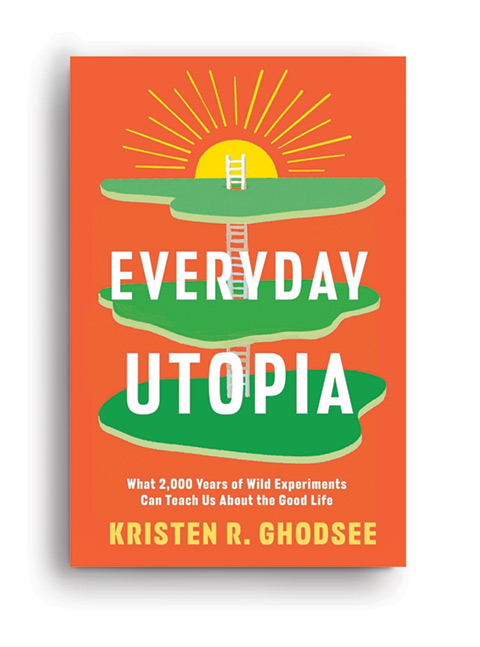Utopia begins at home, according to an expert who looked at attempts over two millennia.

The road to an ideal community can start with the “sharing of the smallest things in our daily lives,” said Kristen R. Ghodsee—a professor and chair of Russian and East European studies at Penn and author of Everyday Utopia: What 2,000 Years of Wild Experiments Can Teach Us About the Good Life—in a virtual presentation by the Penn Arts and Sciences Lightbulb Café and the Penn Global Discovery Series timed for Homecoming.
Ghodsee’s research has focused on “the lived experience of socialism and post-socialism, the gendered effects of the economic transition from Communism to capitalism, and the ethnographic study of post-communist nostalgia in Central and Eastern Europe,” said moderator Julia Alekseyeva, assistant professor of English and Cinema and Media Studies at Penn.
Everyday Utopia offers what Alekseyeva called “a survey of two millennia of utopian approaches in different cultural contexts and across many diverse historical epochs. It takes us on a trip around the world to explore places that reimagine how we might live our daily lives, from Danish cohousing communities to matriarchal Colombian eco villages to Chinese microdistricts.”
While her previous work—she’s authored or coauthored 12 other books—has focused on “top-down kinds of experiments” in socialist or communist societies where laws and administrative decrees are “supposed to kind of trickle down and change the nature of everyday life,” Ghodsee said, “this was a project that wanted to reverse that and look at what people do in their everyday lives.”
When living under oppressive conditions, people don’t just give up. “They fight back, sometimes directly. And sometimes they fight back by running away, or by creating their own little communities outside of the framework,” she said. “A lot of people talk about this concept of ‘prefigurative politics,’ which is when people decide to live in a certain way, they organize their lives as if the world they want to see built already exists.”
Rather than focus on governmental attempts to drive social change, “here I really wanted to look at how, sometimes, ordinary people on the ground make changes and decisions about the way they’re living their own lives and organizing their families and social relations that end up kind of trickling up and changing society in a bigger way.”
Ghodsee said she’s seen even more—and smaller-scale—examples of this phenomenon on her book tour, which has taken her around the US and to Germany, the UK, and Belgium. An excerpt of those remarks can be found below. —JP
“The thing that has really inspired me is that people keep walking up to me after I give a talk and they say, ‘It’s already happening. We’re already doing it. You just can’t see it.’
I’ll give you a concrete example. There was a guy who came up to me after the talk in London and said, ‘You know, in London they have those rowhouses and then everybody has those little gardens in the back. And they’re kind of all fenced off from each other.’ So he and two of his university friends and their wives were getting close to retirement age and their kids were grown. So they decided to buy three row houses right next to each other and they tore down the fences between their gardens, and they’re basically treating those three houses like one big living complex. [To government and other authorities] it just looks like three individual families buying houses right next to each other. They don’t know what’s going on behind the scenes. …
The thing that I missed, I think, when I was writing the book was that every community that I studied was a community that made an intentional decision to live a particular way. And they had a rationale for doing that.
What I’m learning now, is where people are saying, ‘Look what I’m doing in my life that’s different. I’m doing it, I’m already doing it.’ And that is so inspiring, because it made me realize that sometimes change happens because a group of people get together and make a decision about a particular way of living in the world. But sometimes change also happens because smaller subsets of those groups just decide: ‘This sucks. I’m tired of being alone in my house. I’m going to move in with a couple of other people and we’re going to cook meals four nights a week. …
‘When I have kids’—I’ve heard a lot of people saying this—‘my best friend and her husband, we’re all going to buy a house together and raise our kids together like a family because it’s just easier that way, right? We’re going to share a car, and we’re going to share a wheelbarrow and lawnmower and drill and all those other things. It’ll make it cheaper. It’ll make it environmentally more sustainable. It will deal with isolation and loneliness. It will create a happier environment for our kids.’ And that’s just one step, right? That’s just two couples. But imagine if half of new parents decided to do that. …
A lot of people would come up and say, ‘I wouldn’t call myself a utopian—like, I wouldn’t ever use that word—but listening to you talk about utopia makes me think that some of what I’m doing is a little utopian.’ And that is hopeful. That gives us kind of encouragement that we’re being recognized as taking charge and doing something—in the absence, of course, of these larger political changes that we can still hope for and work towards.
But we have to play the long game and the short game, and I think the short game starts at home. It starts with our friends. It starts with our families. It starts with our sharing of the smallest things in our daily lives, and it can make a difference really fast, in a really big way.”




